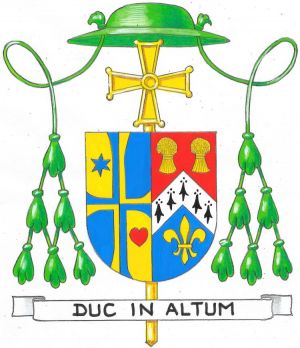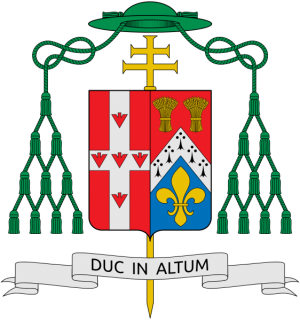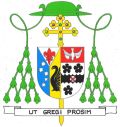Paul Stagg Coakley: Difference between revisions
Knorrepoes (talk | contribs) m (Text replacement - "{{religion}}" to "") |
Knorrepoes (talk | contribs) m (Text replacement - "↵↵''' {{uc:{{PAGENAME}}}} '''↵↵Born" to "''' {{uc:{{PAGENAME}}}} ''' Born") |
||
| Line 1: | Line 1: | ||
''' {{uc:{{PAGENAME}}}} ''' | ''' {{uc:{{PAGENAME}}}} ''' | ||
Revision as of 10:01, 12 July 2023
PAUL STAGG COAKLEY
Born : June 3, 1955
Deceased :
Bishop of Salina, 2004-2011
Archbishop of Oklahoma City, 2011-present
| Bishop of Salina |
Archbishop of Oklahoma City |
Official blazon
Origin/meaning
As common in US episcopal heraldry, the arms show the arms of the diocese impaled with the personal arms of the bishop.
The top of the bishop’s shield is dedicated to the Holy Eucharist and commemorates Pope John Paul II’s nomination of the current ecclesial year (2004-2005) throughout the Universal Church as the «Year of the Eucharist». The color is representative of the Blood of Christ. The first garb represents the Eucharist. The second was selected by Bishop Coakley in representation of the people and landscape of Kansas, his familial home, where the lifeline of wheat plays so integral a role.
Bishop Coakley likewise wished to honor both the Mother of God and his own mother in the design of his personal coat of arms. In so doing, he selected the fleur-de-lys, which the Church has used to symbolize the Blessed Virgin for twelve centuries. Here in the bottom half of his arms, the fleur-de-lys appears in gold, also the color of honesty and truth. Our Lady’s Lily, as the fleur-de-lys is known within the Church, herein also represents Our Lady in the title of "the Immaculate Conception".
The fleur-de-lys is also the ancient emblem of the French people and in selecting it for his coat of arms, Bishop Coakley also honors his beloved late mother, Mary Coakley, who was of French heritage.
Bishop Coakley selected the use of ermine for thhe chevron, which has been the heraldic emblem of a Coakley family (not of the Bishop though) in Ireland for several centuries. More so than this, however, is the use of ermine in ecclesiastical heraldry representing both the ecclesial title of "Christ the King" and the ecclesiological theology of the sovereignty of Christ’s Church on Earth.
The achievement is completed with the heraldic insignia of a prelate of the rank of bishop by instruction of the Holy See, of March 1969, confirmed in March 2001.
This page is part of the Ecclesiastical heraldry portal
|
Catholic heraldry
|
Other Christian churches |
|
Literature : http://www.salinadiocese.org/blazonCoakley.htm, 2005





